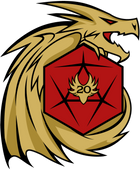A lot of new members of the tabletop gaming world enter through play of Dungeons and Dragons – it’s the most visible, and probably also the most prolific, of TTRPGs. Many people are content to stick with the game, while others move on to different systems, each with their own rules and playstyles.
One of the first things that you’ll notice if you start sorting through different games is the variation in types of dice that get used. In particular, how many fewer dice they often use to play.
DnD Dice Types

D&D uses a set of 7 dice for all of its rolls (You can read about the function of each die individually here). D20s are the standard for attacks, skills, and most abilities, while the others pick up the various damages, health, and bonuses within the game. The more powerful an ability is for a character, the higher the side-number of the die associated with it!
This is notably different from systems like Fate, GURPS, or Warhammer, which mostly use the same die in varying amounts. And in 5th edition DnD, it can feel a little out of place with the streamlined playstyle.
In the end, the main reason that 5e uses the d20 system is that 4e, 3e, Advanced, and Original Dungeons and Dragons used 7 dice, and the set is now a core component of the game! It differentiates D&D from other systems, even similarly high fantasy games. While the exact play of the game changes, from small modifiers to the advantage system, prestige classes to subclasses, the place of each die and what it’s used for remains mostly the same.
Can I play DnD with Fewer than 7 Dice Types?

Since the function of each die is so engrained into D&D’s gameplay, it really isn’t possible to remove dice from the game. To do so, you’d have to transport the whole of the setting and rules into another system! Removing d12s, for instance, would render Barbarians far too difficult to play, since their d12 hit die and weapon damage are a big part of how they’re meant to play with high health and heavy hitting. In turn, it would make every other class artificially powerful, and throw off the whole balance of the classes, monsters, and world.
If you don’t like having to sift through your sets to find exactly the die that you want, I’d recommend trying another game! Fate, Fudge, D6, and D10 systems all use one type of dice, to keep it really simple.
Can I play DnD with More than 7 Dice Types?

This is a little different than removing a die from the game. The standard 7-die set includes most the easily available dice, but you can pretty easily locate unusually-sided dice as novelties. Adding them into D&D can be pretty amusing, although largely unnecessary. You can simply replace the hit or damage die for a character, spell, or weapon with the new die-of-choice without much problem, although it might make them more or less powerful than they were before.
If you’re intent on adding an unusual die, I’d recommend doing so through homebrew content, rather than modifying official, already-included stuff.
For instance, if I were to design a new class that revolved around having really bad luck, I might make their hit die a d13. Not only would this include the ubiquitous unlucky number, but it would give them a little extra health, which a terribly unlucky character may very well need!
There aren’t really any games, at least that I know of, that use more than 7 different kinds of dice. Generally, more dice mean more ‘crunch’ (a gaming term which comes from the phrase ‘crunching the numbers’, which refers to how detailed and minute the bonuses and modifiers that you need to balance are likely to get), an effect which is more easily achieved by having a modifier-heavy, intricate system like Zweihammer, rather than adding types of dice.
Is the 7 Dice Set Ideal?

Really, there’s no such thing as a ‘ideal’ gaming system, either in terms of rules or in numbers of dice. Different people want different things from gaming, and play for different reasons. And the number of dice that a system uses doesn’t necessarily indicate how complex a game is, or how likely it is to fit any particular playstyle.
As I’ve said before, people who prefer roleplay are more likely to enjoy games like Fate or Monster of the Week, which use only one die type, but the 5e system does a pretty good job of prioritizing roleplay with 7 types. People who prefer problem solving and strategy are more likely to enjoy Pathfinder or 3.5e, with their 7 types, but while I haven’t played any strategy-focused games with few dice myself, I’m sure that they’re out there.
Really, the best solution here is to play those things which look interesting to you. Through play, and a little trial and error, you’ll find the game that’s right for you. After all, there’s one out there for practically everyone!
Have you played any one-die-type systems? Which are your favorites? Are there any with a lot of “crunch” to them? Tell us in the comments below!





